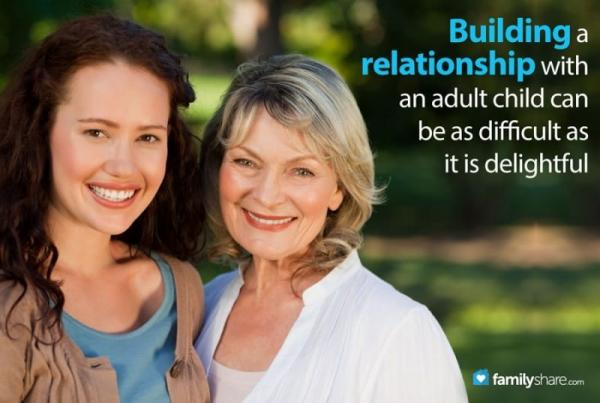
Building a relationship with an adult child can be as difficult as it is delightful. As your child navigates this new world on her own terms, you might feel helpless when you see her making decisions or taking paths that you know will bring her pain. You also might struggle to find new purpose in your own life as you transition from doing everything for your children to doing things only for yourself and your spouse. It is often hard for both parents and children to establish appropriate ways to relate to each other in this transitional period. The following suggestions will help you develop a healthy and fulfilling relationship with your adult child.
1. Be helpful
You are vastly more experienced than he, so provide help when your help is wanted. Being supportive during a trying time in his life will create trust and gratitude in your child. Don't remind him of his weaknesses or inadequacies; just tell him your ideas as you would another adult friend. Sometimes, just listening is the most helpful thing you can do.
2. Treat your child as an equal
Now that she is older and having more life experiences it can be fun to transition your relationship from that of mother or father to friend and equal. Ask her opinion from time to time the way you would a respected friend. She might surprise you with her wisdom and insight. You will always be your child's parent, now you can also be her friend.
3. Take an interest in your children and grandchildren's lives but retain your own interests, too. Your adult children and their families need to have a certain amount of autonomy in order to function in a healthy way. By taking an interest in their lives, but maintaining your own separate life, you can keep a reasonable balance between your role as parent or grandparent and your role as an individual. Besides, you will be happier and more pleasant to be around if you are active and doing things you love.
4. Solve your own problems
Even though, your child is now an adult you should not rely on him to come to your rescue every time you need help with something. Try to find other resources for help such as, your spouse, a neighbor or a friend. You will feel better about yourself if you help your children with their problems more than you are helped by them.
5. Be considerate
Try to remember how you felt at that age and how you would have liked your parents to treat you. Ask your son or daughter to tell you when they feel that you are overstepping or being inconsiderate and adjust your actions accordingly.
6. Cultivate your sense of humor
Try not to get your feelings hurt if your adult child becomes frustrated with you or pulls away. It is normal for children to become irritated with their parents while they are trying to establish their own separate identity as an adult. If you can learn to laugh things off, your child will learn to do the same, and you will be able to develop a relationship that you both can enjoy.

